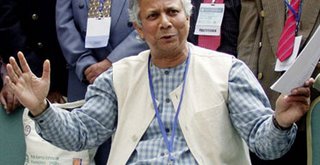Yunus awarded Nobel Peace Prize
 Photograph: Shafiq Alam/AFP/Getty Images.
Photograph: Shafiq Alam/AFP/Getty Images.Pioneering economist wins Nobel prize
Mark Tran
Friday October 13, 2006
Guardian Unlimited
Professor Muhammad Yunus, winner of the Nobel peace prize and founder of the Grameen Bank, which offers loans to poor people without any financial security.
Muhammad Yunus and the Grameen Bank today emerged as the surprise winners of the prestigious Nobel peace prize for their pioneering work in lending to the poor.
Mr Yunus, 66, from Bangladesh, started the Grameen Bank over 30 years ago, to provide small loans - micro-credit - for the poor. In announcing the award, the Norwegian Nobel committee said the prize - worth 10m Swedish kronor (£728,971) - was going jointly to Mr Yunus and Grameen Bank for "their efforts to create economic and social development from below".
"This is a fantastic news for all of us, for Grameen Bank, Bangladesh, and all the poor countries and all the poor people all around the world," Mr Yunus told Norwegian television.
He said the Nobel peace prize was the pinnacle of recognition after winning several prizes for his work lending to the poor, mainly women. "This is the last prize. That's what's so special about it ... it's the sky," he said.
The committee said: "Muhammad Yunus has shown himself to be a leader who has managed to translate visions into practical action for the benefit of millions of people, not only in Bangladesh, but also in many other countries.
"Loans to poor people without any financial security had appeared to be an impossible idea." The Grameen Bank provides credit to "the poorest of the poor" in rural Bangladesh, without any collateral, according to its web site.
From modest beginnings, the Nobel committee said, Mr Yunus and the bank have "developed micro-credit into an ever more important instrument in the struggle against poverty. Grameen Bank has been a source of ideas and models for the many institutions in the field of micro-credit that have sprung up around the world."
Mr Yunus and the Grameen Bank beat much better known names to the award.
The favourite, in the eyes of many commentators, was the former Finnish president Martti Ahtisaari, who helped broker peace between the Indonesian government and rebels from the Gam movement in the province of Aceh last year.
"Every single individual on earth has both the potential and the right to live a decent life," the Nobel committee said.
"Across cultures and civilisations, Yunus and Grameen Bank have shown that even the poorest of the poor can work to bring about their own development."
To read the original article in The Guardian, click on:
The Guardian
Friday October 13, 2006
Guardian Unlimited
The egalitarian economist
Angered by the plight of the rural poor in his native Bangladesh, Muhammad Yunus combined financial acumen with the pursuit of equality, says Mark Tran
Professor Muhammad Yunus, 66, pioneered the idea of micro-finance - lending small amounts of money to the poorest people in Bangladesh without collateral.
Mr Yunus, the founder and managing director of the Grameen Bank, thought that if financial resources can be made available to the poor people on terms and conditions that were appropriate and reasonable, "millions of small people with their millions of small pursuits can add up to create the biggest development wonder".
The Grameen Bank, like any capitalist enterprise, saw a market that had been neglected and went after it. But Mr Yunus was not just a capitalist, he was also interested in development. With Grameen, he created a vehicle that combined capitalism and social responsibility.
As the bank says on its website: "Credit is a cost-effective weapon to fight poverty and it serves as a catalyst in the overall development of socio-economic conditions of the poor who have been kept outside the banking orbit on the ground that they are poor and hence not bankable."
To read the full article from The Guardian, click on:
The Guardian


<< Home